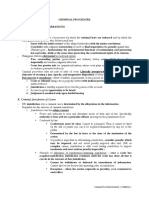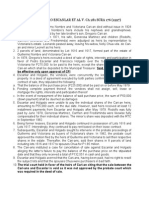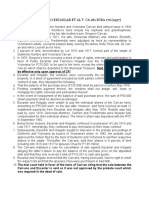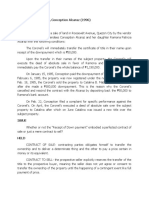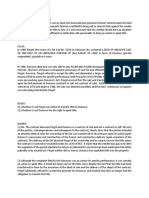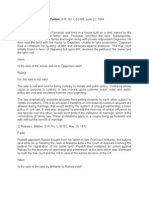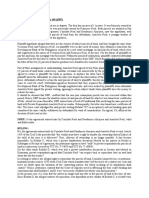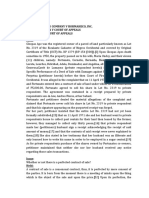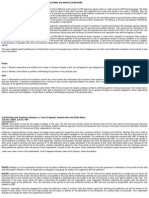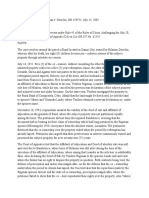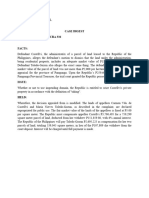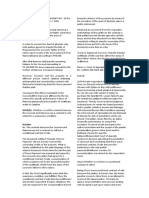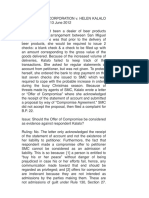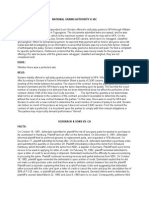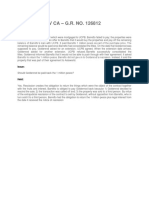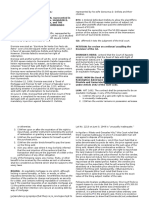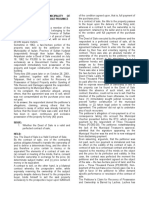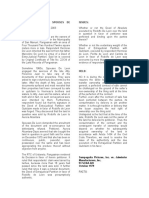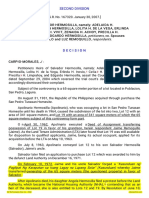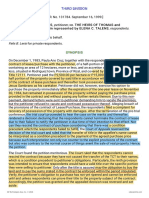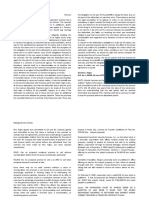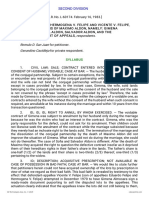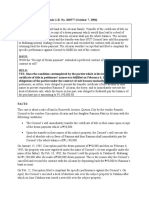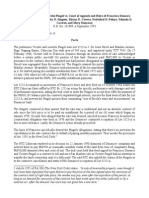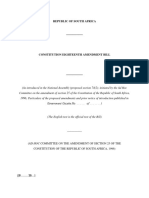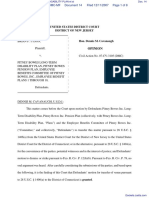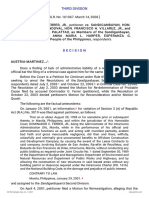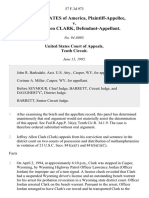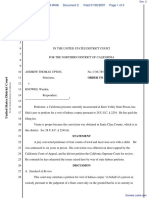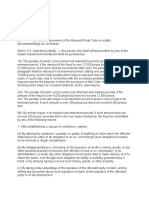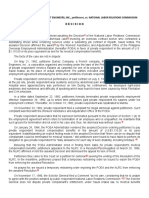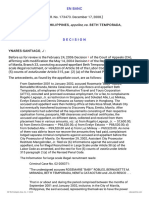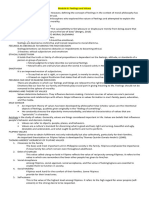Law On Sales
Law On Sales
Uploaded by
Ferlle GarciaCopyright:
Available Formats
Law On Sales
Law On Sales
Uploaded by
Ferlle GarciaOriginal Title
Copyright
Available Formats
Share this document
Did you find this document useful?
Is this content inappropriate?
Copyright:
Available Formats
Law On Sales
Law On Sales
Uploaded by
Ferlle GarciaCopyright:
Available Formats
LADANGA V. CA FACTS: Clemencia Aseneta, a spinster, had a nephew named Bernardo and a niece named Salvacion.
She legally adopted Bernardo in 1961. On April 6, 1974, Clemencia signed 9 deeds of sale in favor of Salvacion for various real properties, one being the Paco property which is the subject of this petition, and purportedly sold for P26,000. In May 1975, Bernardo, as guardian of Clemencia, filed a case for reconveyance of the Paco property. Clemencia testified that she had not received a single centavo from Salvacion. The trial court, affirmed by the Court of Appeals, declared the sale void. ISSUE: Whether the sale is void for lack of consideration HELD: The Ladanga spouses contend that the Appellate Court disregarded the rule on burden of proof. This contention is devoid of merit because Clemencia herself testified that the price of P26,000 was not paid to her. The burden of the evidence shifted to the Ladanga spouses. They were not able to prove the payment of that amount. The sale was fictitious. A contract of sale is void and produces no effect whatsoever where the price, which appears therein as paid, has in fact never been paid by the purchaser to the vendor. It was not shown that Clemencia intended to donate the Paco property to the Ladangas. Her testimony and the notary's testimony destroyed any presumption that the sale was fair and regular and for a true consideration. PINGOL V. COURT OF APPEALS A vendee in an oral contract to convey land who had made part payment thereof, entered upon the land and had made valuable improvements thereon is entitled to bring suit to clear his title against the vendor who had refused to transfer the title to him. It is not necessary that the vendee should have an absolute title, an equitable title being sufficient to clothe him with personality to bring an action to quiet title. FACTS: In 1969, Pingol, the owner of a lot (Lot No. 3223) in Caloocan City, executed a DEED OF ABSOLUTE SALE OF ONE-HALF OF AN UNDIVIDED PORTION OF [his] PARCEL OF LAND in favor of Donasco (private respondent), payable in 6 years. In 1984, Donasco died and was only able to pay P8,369 plus P2,000 downpayment, leaving a balance of P10,161. The heirs of Donasco remained in possession of such lot and offered to settle the balance with Pingol. However, Pingol refused to accept the offer and demanded a larger amount. Thus, the heirs of Donasco filed an action for specific performance (with Prayer for Writ of Prelim. Injunction, because Pingol were encroaching upon Donascos lot). Pingol averred that the sale and transfer of title was conditional upon the full payment of Donasco (contract to sell, not contract of sale). With Donascos breach of the contract in 1976 and death in 1984, the sale was deemed cancelled, and the heirs continuous occupancy was only being tolerated by Pingol. ISSUES:
(1) Whether or not Pingol can refuse to transfer title to Donasco (2) Whether or not Donasco has the right to quiet title RULING: (1) No. The contract between Pingol and Donasco is a contract of sale and not a contract to sell. The acts of the parties, contemporaneous and subsequent to the contract, clearly show that the parties intended an absolute deed of sale; the ownership of the lot was transferred to the Donasco upon its actual (upon Donascos possession and construction of the house) and constructive delivery (upon execution of the contract). The delivery of the lot divested Pingol of his ownership and he cannot recover the title unless the contract is resolved or rescinded under Art. 1592 of NCC. It states that the vendee may pay even after the expiration of the period stipulated as long as no demand for rescission has been made upon him either judicially or by notarial act. Pingol neither did so. Hence, Donasco has equitable title over the property. (2) Although the complaint filed by the Donascos was an action for specific performance, it was actually an action to quiet title. A cloud has been cast on the title, since despite the fact that the title had been transferred to them by the execution of the deed of sale and the delivery of the object of the contract, Pingol adamantly refused to accept the payment by Donascos and insisted that they no longer had the obligation to transfer the title. Donasco, who had made partial payments and improvements upon the property, is entitled to bring suit to clear his title against Pingol who refused to transfer title to him. It is not necessary that Donasco should have an absolute title, an equitable title being sufficient to clothe him with personality to bring an action to quiet title. Prescription cannot also be invoked against the Donascos because an action to quiet title to property in ONEs POSSESSION is imprescriptible. THE HEIRS OF PEDRO ESCANLAR ET AL V. CA 281 SCRA 176 (1997) FACTS: Spouses Guillermo Nombre and Victoriana Cari-an died without issue in 1924 and 1938, respectively. Nombres heirs include his nephews and grandnephews. Victoriana was succeeded by her late brothers son, Gregorio Cari-an. 1. After Gregorios death in 1971, his wife, Generosa Martinez and children (Rodolfo, Carmen, Leonardo and Fredisminda) were adjudged as heirs by representation to Victorianas estate. Leonardo passed away, leaving his widow, Nelly Chua vda. de Cari-an and minor Leonell as his heirs 2. 2 parcels of land, denominated by Lot 1616 and 1617, formed part of the estate of Guillermo Nombre and Victoriana Cari-an. 3. In 1978, Gregorios heirs executed a deed of sale of rights, interests and participation in favor of Pedro Escanlar and Francisco Holgado over the undivided share of Victoriana for P275,000 to be paid to the heirs, except the share of the minor Leonell Cari-an which shall be deposited to the Municipal Treasurer. Said contract of sale will be effective only upon approval of CFI 4. Escanlar and Holgado, the vendees, were concurrently the lessees of the subject property. In a deed of agreement executed by both parties confirming and affirming the contract of sale, they stipulated the following:
a. That the balance of the purchase price (P225,000) shall be paid on or before May 1979 b. Pending complete payment thereof, the vendees shall not assign, sell, lease or mortgage the rights, interests and participation thereof c. In the event of nonpayment of the balance of said purchase price, the sum of P50,000 (down payment) shall be deemed as damages 5. Escanlar and Holgado were unable to pay the individual shares of the Cari-an heirs, amounting to P55,000 each, on the due date. However, said heirs received at least 12 installment payments from Escanlar and Holgado after May 1979. Rodolfo was fully paid by June 1979, Generosa Martinez, Carmen and Fredisminda were likewise fully compensated for their individual shares. The minors share was deposited with the RTC in September 1982. 6. Being former lessees, Escanlar and Holgado continued in possession of Lots 1616 and Lots 1617. Interestingly, they continued to pay rent based on their lease contract. 7. Subsequently, Escanlar and Holgado sought to intervene in the probate proceedings of Guillermo and Victoriana as buyers of Victorianas share. In 1982, the probate court approved the motion filed by the heirs of Guillermo and Victoriana to sell their respective shares in the estate. Thereafter, the Cari-ans, sold their shares in 8 parcels of land including lots 1616 and 1617 to spouses Chua for P1.85 million. 8. The Cari-ans instituted a case for cancellation of sale against Escanlar and Holgado alleging the latters failure to pay the balance of the purchase price on the stipulated date and that they only received a total of P132,551 in cash and goods. 9. Escanlar and Holgado averred that the Cari-ans, having been paid, had no right to resell the subject lots and that the spouses Chua were purchasers in bad faith. 10. The trial court held in favor of the heirs of Cari-an citing that the sale between the Cari-ans and Escanlar is void as it was not approved by the probate court which was required in the deed of sale. 11. CA affirmed the same and cited that the questioned deed of sale of rights is a contract to sell because it shall become effective only upon approval by the probate court and upon full payment of the purchase price. ISSUE: WON the non-happening of a condition affects the validity of the contract itself HELD: No, the non-happening of a condition only affects the effectivity and not the validity of the contract. Under Art 1318 Civil Code, the essential requisites of a contract are: consent of the contracting parties; object certain which is the subject matter of the contract and cause of the obligation which is established. Absent one of the above, no contract can arise. Conversely, where all are present, the result is a valid contract. However, some parties introduce various kinds of restrictions or modalities, the lack of which will not, however, affect the validity of the contract. In the instant case, the Deed of Sale, complying as it does with the essential requisites, is a valid one. However, it did not bear the stamp of approval of the court. The contracts validity was not affected for in the words of the stipulation, this Contract of Sale of rights, interests and participations shall become effective only upon the approval by the Honorable Court In other words, only the effectivity and not the validity of the contract is affected.
CONTRACT TO SELL VS. CONTRACT TO SALE In contracts to sell, ownership is retained by the seller and is not to pass until the full payment of the price. Such payment is a positive suspensive condition, the failure of which is not a breach of contract but simply an event that prevented the obligation of the vendor to convey title from acquiring binding force. To illustrate, although a deed of conditional sale is denominated as such, absent a proviso that title to the property sold is reserved in the vendor until full payment of the purchase price nor a stipulation giving the vendor the right to unilaterally rescind the contract the moment the vendee fails to pay within a fixed period, by its nature, it shall be declared a deed of absolute sale. In a contract of sale, the non-payment of the price is a resolutory condition which extinguishes the transaction that, for a time, existed and discharges the obligations created thereunder. The remedy of an unpaid seller in a contract of sale is to seek either specific performance or rescission. In the case at bar, the sale of rights, interests and participation as to portion pro indiviso of the 2 subject lots is a contract of sale for the reasons that (1) the sellers did not reserve unto themselves the ownership of the property until full payment of the unpaid balanceof P225,000.00; (2) there is no stipulation giving the sellers the right to unilaterally rescind the contract the moment the buyer fails to pay within the fixed period. NEED OF PROBATE COURTS APPROVAL EXISTS WHERE SPECIFIC PROPERTIES OF THE ESTATE ARE SOLD AND NOT WHEN IDEAL AND INDIVISIBLE SHARES OF AN HEIR ARE DISPOSED OF The need for approval by the probate court exists only where specific properties of the estate are sold and not when only ideal and indivisible shares of an heir are disposed of. In Dillena v. Court of Appeals, the Court declared that it is within the jurisdiction of the probate court to approve the sale of properties of a deceased person by his prospective heirs before final adjudication. The probate courts approval is necessary for the validity of any disposition of the decedents estate. However, reference to judicial approval cannot adversely affect the substantive rights of the heirs to dispose of their ideal share in the co-heirship and/or co-ownership among the heirs. It must be recalled that during the period of indivision of a decedents estate, each heir, being a co-owner, has full ownership of his part and may therefore alienate it. But the effect of the alienation with respect to the co-owners shall be limited to the portion which may be allotted to him in the division upon the termination of the co-ownership. CONTRACTUAL STIPULATIONS CONSIDERED LAW BETWEEN PARTIES; EXCEPTION: CONTEMPORANEOUS ACTS OF PARTIES As a general rule, the pertinent contractual stipulation (requiring court approval) should be considered as the law between the parties. However, the presence of two factors militates against this conclusion: (1) the evident intention of the parties appears to be contrary to the mandatory character of said stipulation. Whoever crafted the document of conveyance, must have been of the belief that the controversial stipulation was a legal requirement for the validity of the sale. But the contemporaneous and subsequent acts of the parties reveal that the original objective of the parties was to give effect to the deed of sale even without court approval.
Receipt and acceptance of the numerous installments on the balance of the purchase price by the Cari-ans, although the period to pay the balance of the purchase price expired in May 1979, and leaving Escanlar and Holgado in possession of Lots 1616 and 1617 reveal their intention to effect the mutual transmission of rights and obligations. The Cari-ans did not seek judicial relief until late 1982 or three years later; (2) the requisite approval was virtually rendered impossible by the Cari-ans because they opposed the motion for approval of the sale filed by Escanlar and Holgado, and sued the latter for the cancellation of that sale. Having provided the obstacle and the justification for the stipulated approval not to be granted, the Carians should not be allowed to cancel their first transaction with Escanlar and Holgado because of lack of approval by the probate court, the lack of which is of their own making.
[G.R. NO. 118347. OCTOBER 24, 1996.]VICENTE AND MICHAEL LIM, PETITIONERS, VS. COURT OF APPEALS AND LIBERTY H.LUNA, RESPONDENTS. FACTS: On September 2, 1988 private respondent Liberty Luna sold her 1,013.6 squaremeters parcel of land (located at the corner of G. Araneta Avenue and Quezon Avenue inQuezon City. ) to petitioners Vicente and Michael Lim for P3,547,600.00. She receivedP200k as earnest money from Zapata Ralty (petitioners' broker) and the balance shall be paid in full after the squatters/occupants have totally vacated the premises. It was also stated in their agreement that Luna assumes responsibility to eject said squatters within60 days from the date of receipt of earnest money;; and in case the seller shall fail in her commitment to eject the squatters/occupants within said period, the seller shall refund to the buyer this sum of P200,000.00; [plus another sum of ONE HUNDRED THOUSAND(P100,000.00) PESOS as liquidated damages]; however, if the buyer shall fail to pay the balance after the seller has ejected the squatters/occupants, this sum of P200,000.00shall be forfeited by the seller. Luna signed the agreement but crossed out the additional P100k liquidated damages. Private respondent Luna failed to eject the squatters from the land despite her alleged efforts to do so. It appears that private respondent asked the help of a building official and a city engineer to effect ejectment. Nonetheless, petitioners did not demand the return of their earnest money. Thereafter, parties met again to negotiate a price increase to facilitate the ejectment of the squatters. The parties agreed to an increase of P500.00 per square meter, by rounding off the total purchase price to P4, 000,000.00, with the remaining 13.6 square meters of the 1,013.6 square meters given as a discount. Less the P200, 000.00 given as earnest money, the balance to be paid by petitioners wasP3,800,000.00.After a few days, private respondent tried to return the earnest money alleging her failure to eject the squatters. She claimed that as a result of her failure to remove the squatters from the land, the contract of sale ceased to exist and she no longer had the obligation to sell and deliver her property to petitioners. ISSUE: Whether the non-fulfilment of the condition of ejecting the squatters resulted in defendant's losing the right to demand that plaintiff sell the land to them HELD: NO. The agreement, as quoted above, shows a perfected contract of sale. Under Art.1475 of the Civil Code, there is a perfected contract of sale if there is a meeting of the minds on the
subject and the price. Indeed, the earnest money given is proof of the perfection of the contract. . It is true that private respondent undertook to eject the squatters before delivery of the property within a certain period and that for her failure to carry out her obligation she could be ordered to refund the P200, 000.00 earnest money. But whether she would be obliged to do so depend on petitioners who can waive the condition and opt to proceed with the sale instead. Private respondent Luna contends that as the condition of ejecting the squatters was not met, she no longer has an obligation to proceed with the sale of her lot. This contention is erroneous. Private respondent fails to distinguish between a condition imposed on the perfection of the contract and a condition imposed on the performance of an obligation. Failure to comply with the first condition results in the failure of contract, while failure to comply with the second condition only gives the other party the option either to refuse to proceed with the sale or to waive the condition. In this case, there is already a perfected contract. The condition was imposed only on the performance of the obligation. Hence, petitioners have the right to choose whether to demand the return of P200, 000.00 which they have paid as earnest money or to proceed with the sale. They have chosen to proceed with the sale and private respondent cannot refuse to do so. Indeed, private respondent is not the injured party. She cannot rescind the contract without violating the principle of mutuality of contracts, which prohibits allowing the validity and performance of contracts to be left to the will of one of the parties.
You might also like
- Criminal Procedure Notes PDFDocument46 pagesCriminal Procedure Notes PDFAleezah Gertrude Raymundo100% (10)
- 15 Tender of PaymentDocument8 pages15 Tender of PaymentJong Perraren100% (2)
- Lagman v. Pimentel III Case DigestDocument2 pagesLagman v. Pimentel III Case DigestLIERA67% (3)
- Compilation of Case Digest On Law of SalesDocument107 pagesCompilation of Case Digest On Law of SalesStella BertilloNo ratings yet
- The Heirs of Pedro Escanlar Et Al v. CA 281 Scra 176 (1997)Document3 pagesThe Heirs of Pedro Escanlar Et Al v. CA 281 Scra 176 (1997)Gedan TanNo ratings yet
- The Heirs of Pedro Escanlar Et Al V CA 281 Scra 176 1997Document3 pagesThe Heirs of Pedro Escanlar Et Al V CA 281 Scra 176 1997bananayellowsharpieNo ratings yet
- Heirs of Escanlar Vs CADocument4 pagesHeirs of Escanlar Vs CARia Kriselle Francia Pabale100% (1)
- Sales - Dy JR v. CA - Sps Santiago v. VillamorDocument4 pagesSales - Dy JR v. CA - Sps Santiago v. VillamorMariaAyraCelinaBatacanNo ratings yet
- Del Ocampo Vs Heirs of RegaladoDocument4 pagesDel Ocampo Vs Heirs of RegaladoWV Gamiz Jr.No ratings yet
- Co Ownership DigestsDocument24 pagesCo Ownership Digestsmelaniem_1No ratings yet
- Sales Case Digest Batch 8Document29 pagesSales Case Digest Batch 8LOUISE ELIJAH GACUANNo ratings yet
- Almira Vs Court of Appeals GR No. 115966 March 20, 2003 Topic: Article 1191 Rescission of Contract FactDocument8 pagesAlmira Vs Court of Appeals GR No. 115966 March 20, 2003 Topic: Article 1191 Rescission of Contract FactJani MisterioNo ratings yet
- Sales Digest 1Document19 pagesSales Digest 1JackNo ratings yet
- CasesDocument8 pagesCasesBlairEmrallafNo ratings yet
- Titong v. CA 287 SCRA 102 DOCTRINE: The Ground or Reason For Filing A Complaint For Quieting of Title Must Therefore BeDocument6 pagesTitong v. CA 287 SCRA 102 DOCTRINE: The Ground or Reason For Filing A Complaint For Quieting of Title Must Therefore BeNikko SterlingNo ratings yet
- 69 Pingol Vs CA 226 SCRA 118 DigestDocument2 pages69 Pingol Vs CA 226 SCRA 118 DigestRonald Alasa-as AtigNo ratings yet
- Sales Cases DigestDocument7 pagesSales Cases Digestgp_ph86No ratings yet
- Assignment 3 Mahinay, Beya AmmahryDocument32 pagesAssignment 3 Mahinay, Beya AmmahryAmmahry BeyNo ratings yet
- Case Digests2Document8 pagesCase Digests2KwekNo ratings yet
- Heirs of Cayetano Pangan and Consuelo Pangan vs. Spouses Rogelio Perreras and Priscilla PerrerasDocument8 pagesHeirs of Cayetano Pangan and Consuelo Pangan vs. Spouses Rogelio Perreras and Priscilla PerrerasChristopher Martin GunsatNo ratings yet
- 1582-1635 Sales Case DigestDocument12 pages1582-1635 Sales Case DigestAziel Marie C. Guzman100% (1)
- Rio vs. YutecDocument5 pagesRio vs. YutecPatrice ThiamNo ratings yet
- GR 159999Document2 pagesGR 159999Carmelita DecomotanNo ratings yet
- Conventional Redemption Legaspi Vs CaDocument9 pagesConventional Redemption Legaspi Vs CaRosette G. ReynoNo ratings yet
- Set CasesDocument10 pagesSet CasesAdrian HilarioNo ratings yet
- Spouses Doromal Vs CaDocument11 pagesSpouses Doromal Vs CaArvin RobertNo ratings yet
- Sales Digest 123Document7 pagesSales Digest 123Corina ChuaNo ratings yet
- Del Val Vs Del ValDocument2 pagesDel Val Vs Del ValLoisse VitugNo ratings yet
- 008 - Rigonan Vs DerechoDocument2 pages008 - Rigonan Vs DerechoRalph VelosoNo ratings yet
- Property Assignment8302017Document5 pagesProperty Assignment8302017Andrea DeloviarNo ratings yet
- Villar - CaseDigest 3Document5 pagesVillar - CaseDigest 3Emmanuel VillarNo ratings yet
- Ang Yu Asuncion Vs CA G.R. No. 109125, December 2, 1994Document32 pagesAng Yu Asuncion Vs CA G.R. No. 109125, December 2, 1994Themis ArtemisNo ratings yet
- Sales Case Digests Mid 1Document20 pagesSales Case Digests Mid 1louis jansen100% (1)
- Dignos V Court of AppealsDocument7 pagesDignos V Court of AppealsJoshua ParilNo ratings yet
- Dignos V Court of AppealsDocument11 pagesDignos V Court of AppealsJoshua ParilNo ratings yet
- CASESDocument6 pagesCASESDonita Mariz PalarcaNo ratings yet
- 1 - Obligations of The Seller - Case DigestDocument24 pages1 - Obligations of The Seller - Case DigestJoshua RiveraNo ratings yet
- LTD Week 6 Case DigestsDocument7 pagesLTD Week 6 Case DigestsAnjNo ratings yet
- Cases in Obligation and ContractsDocument5 pagesCases in Obligation and ContractsBernardo L. SantiagoNo ratings yet
- Untitled 5Document5 pagesUntitled 5Bai Noraiza SantosNo ratings yet
- Fuerte Part 1 DigestDocument8 pagesFuerte Part 1 DigestOlenFuerteNo ratings yet
- NGAvsIAC To NoolvsCADocument4 pagesNGAvsIAC To NoolvsCAMariaAyraCelinaBatacanNo ratings yet
- Sales 2nd Batch Cases (Digest)Document13 pagesSales 2nd Batch Cases (Digest)Luriza SamaylaNo ratings yet
- Retro" Over A 50,000-Square Meter Portion of Lot No. 1213Document43 pagesRetro" Over A 50,000-Square Meter Portion of Lot No. 1213Anonymous 6i1wUgzNo ratings yet
- Sales DigestDocument12 pagesSales DigestAndre SolisNo ratings yet
- Sales DigestDocument5 pagesSales DigestSheeray Cyclyd100% (1)
- Ali Akang Vs - Municipality of Isulan, Sultan Kudarat Province FactsDocument9 pagesAli Akang Vs - Municipality of Isulan, Sultan Kudarat Province FactsCrystal Joy MalizonNo ratings yet
- Sales and LeaseDocument7 pagesSales and LeaseMiley LangNo ratings yet
- Petitioners Vs Vs Respondents: Second DivisionDocument6 pagesPetitioners Vs Vs Respondents: Second DivisionJade BehecNo ratings yet
- Bus Org Case Digest Compile IncompleteDocument19 pagesBus Org Case Digest Compile IncompleteWuwu WuswewuNo ratings yet
- Petitioner Vs Vs Respondents Felix L. Gonzales Felix B. LerioDocument13 pagesPetitioner Vs Vs Respondents Felix L. Gonzales Felix B. LerioMichaella Claire LayugNo ratings yet
- This Court Declared in Categorical: Factual AntecedentsDocument9 pagesThis Court Declared in Categorical: Factual AntecedentsBig BoysNo ratings yet
- Extinguishment of Sale - DomzDocument5 pagesExtinguishment of Sale - Domzrosario orda-caiseNo ratings yet
- Felipe v. Heirs of AldonDocument6 pagesFelipe v. Heirs of AldonLorebeth EspañaNo ratings yet
- Sales Cases (16 July 2012) 1Document5 pagesSales Cases (16 July 2012) 1Argel Joseph CosmeNo ratings yet
- Coronel vs. Court of Appeals G.R. No. 103577 (October 7, 1996)Document5 pagesCoronel vs. Court of Appeals G.R. No. 103577 (October 7, 1996)Karen Ryl Lozada BritoNo ratings yet
- Coronel vs. Court of Appeals G.R. No. 103577 (October 7, 1996)Document5 pagesCoronel vs. Court of Appeals G.R. No. 103577 (October 7, 1996)Karen Daryl BritoNo ratings yet
- GROUP 2 Case DigestDocument13 pagesGROUP 2 Case DigestMichelle MasalonNo ratings yet
- Cases in Sales 69-71Document6 pagesCases in Sales 69-71emyNo ratings yet
- Sps. Lourdes and Vicente Pingol vs. Court of Appeals and Heirs of Francisco Donasco, G.R. No. 102909, 6 September 1993Document3 pagesSps. Lourdes and Vicente Pingol vs. Court of Appeals and Heirs of Francisco Donasco, G.R. No. 102909, 6 September 1993Archibald Jose Tiago ManansalaNo ratings yet
- Sps. Ventura vs. Sps. EndayaDocument8 pagesSps. Ventura vs. Sps. EndayaCrisDBNo ratings yet
- Cape Law: Texts and Cases - Contract Law, Tort Law, and Real PropertyFrom EverandCape Law: Texts and Cases - Contract Law, Tort Law, and Real PropertyNo ratings yet
- Francisco vs. Atty Portugal Facts: in Re: Atty Adriano FactsDocument8 pagesFrancisco vs. Atty Portugal Facts: in Re: Atty Adriano FactsCamille Anne DavidNo ratings yet
- Bar Questions For Crim 2 Part 1Document6 pagesBar Questions For Crim 2 Part 1CrizziaNo ratings yet
- Land Amendment BillDocument6 pagesLand Amendment BillBusinessTech100% (3)
- TYSON v. PITNEY BOWES LONG-TERM DISABILITY PLAN Et Al - Document No. 14Document8 pagesTYSON v. PITNEY BOWES LONG-TERM DISABILITY PLAN Et Al - Document No. 14Justia.comNo ratings yet
- United States District Court For The District of ColumbiaDocument30 pagesUnited States District Court For The District of ColumbiaTechno Fog86% (7)
- United States v. Terry Wayne Hilton A/K/A Wayne Milton, William J. Baggett and Andrew N. Stover, 619 F.2d 127, 1st Cir. (1980)Document9 pagesUnited States v. Terry Wayne Hilton A/K/A Wayne Milton, William J. Baggett and Andrew N. Stover, 619 F.2d 127, 1st Cir. (1980)Scribd Government DocsNo ratings yet
- Ferrer Jr. v. SandiganbayanDocument8 pagesFerrer Jr. v. Sandiganbayanlovekimsohyun89No ratings yet
- United States v. Jeffrey Allen Clark, 57 F.3d 973, 10th Cir. (1995)Document7 pagesUnited States v. Jeffrey Allen Clark, 57 F.3d 973, 10th Cir. (1995)Scribd Government DocsNo ratings yet
- Marcellana and Gumanoy V The Philippines, Case No. 1560-2007Document12 pagesMarcellana and Gumanoy V The Philippines, Case No. 1560-2007Leica JaymeNo ratings yet
- Upton v. Knowles - Document No. 2Document3 pagesUpton v. Knowles - Document No. 2Justia.comNo ratings yet
- 315 Estafa DefenseDocument10 pages315 Estafa DefenseAnonymous gAkmNz100% (1)
- Laperal Development Corp. Et - Al. v. Court of Appeals (1993)Document9 pagesLaperal Development Corp. Et - Al. v. Court of Appeals (1993)Adelyn Joy SalvadorNo ratings yet
- Vladek FillerDocument44 pagesVladek FillerNEWS CENTER MaineNo ratings yet
- Ethics Written Report Chapter 1 6Document40 pagesEthics Written Report Chapter 1 6Lenneymae MendozaNo ratings yet
- Punishment AND Theories of Punishment: Submitted To: Submitted By: Ms. Harjot Kaur Somesh Goyal LL.M 1yr PG1899003024Document13 pagesPunishment AND Theories of Punishment: Submitted To: Submitted By: Ms. Harjot Kaur Somesh Goyal LL.M 1yr PG1899003024Somesh GoyalNo ratings yet
- 01 PadmanabhaReddy01Document4 pages01 PadmanabhaReddy01Balajee ConjeevaramNo ratings yet
- Dumez vs. NLRCDocument3 pagesDumez vs. NLRCRuel ReyesNo ratings yet
- 73 People v. TemporadaDocument62 pages73 People v. TemporadaCarlota Nicolas VillaromanNo ratings yet
- 5.ramirez vs. Court of Appeals, G.R. No. 93833, September 28, 1995Document3 pages5.ramirez vs. Court of Appeals, G.R. No. 93833, September 28, 1995Kate Bianca CaindoyNo ratings yet
- First Presentment Verification of DebtDocument8 pagesFirst Presentment Verification of DebtHorsetail Goatsfoot100% (9)
- 12 - Stip of DismissalDocument1 page12 - Stip of DismissalSarah BursteinNo ratings yet
- Handout On Advanced Sentencing Law, FACDL 2014 Criminal Law Board Certification Review SeminarDocument212 pagesHandout On Advanced Sentencing Law, FACDL 2014 Criminal Law Board Certification Review SeminarFlorida Sentencing100% (1)
- Constitutions and Legal System OutlineDocument13 pagesConstitutions and Legal System OutlineGodfrey G. TeshaNo ratings yet
- Criminal Law 1Document3 pagesCriminal Law 1ShedNo ratings yet
- Decision: Court of AppealsDocument16 pagesDecision: Court of AppealsBrian del MundoNo ratings yet
- Ethics ReviewerDocument10 pagesEthics ReviewerQueen Ellanis AzanaNo ratings yet
- Torts and Damages Part 1Document142 pagesTorts and Damages Part 1ConnieAllanaMacapagaoNo ratings yet
- People vs. Canoy, 328 SCRA 385 (2000) PDFDocument6 pagesPeople vs. Canoy, 328 SCRA 385 (2000) PDFRodolfo Villamer Tobias Jr.No ratings yet
